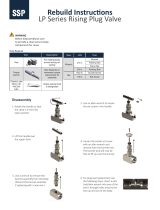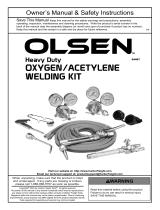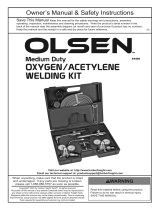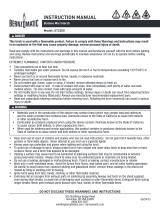Page is loading ...

400 SERIES HEAVY DUTY
CUTTING ATTACHMENT, TIP SERIES 1
PARTS, SERVICE
& REPAIR BULLETIN
CA411-1
VictorTechnologies.com
Issue Date: August 21, 2013
Manual No: 0056-3719 Revision: AB

2
Table of Contents
SECTION 1: GENERAL SAFETY INFORMATION ......................................2
1.01 Commonly Used Terms ...................................................2
SECTION 2: SPECIFICATIONS ................................................................3
2.01 CA411-1 Victor Cutting Attachment ................................3
2.02 Repair Parts List ..............................................................3
SECTION 3: SERVICE & REPAIR INSTRUCTIONS ...................................4
3.01 Recommended Tools & Supplies for Repair Procedures . 4
3.02 Cleaning Procedures .......................................................4
3.03 Control Valve Repair Kit ...................................................4
3.04 Cutting Lever ................................................................... 4
3.05 H.P. Oxy Valve Repair Kit ................................................. 5
3.06 Cone End Assembly Repair Kit ........................................5
3.07 400 Series Head Repair Kit ..............................................6
3.08 Gas Feed Tubes ...............................................................6
SECTION 4: TEST PROCEDURES ...........................................................7
4.01 Recommended Tools & Supplies for Test Procedures .....7
4.02 Leak Test the Gas Regulator ............................................ 7
4.03 Leak Testing the Torch .....................................................7
4.04 Flame Testing the Torch ...................................................7
SECTION 1: GENERAL SAFETY INFORMATION
Read and understand all safety and operating instructions provided before using this apparatus. RETAIN THESE INSTRUCTIONS IN A
READILY AVAILABLE LOCATION FOR FUTURE REFERENCE.
!
WARNING
DO NOT attempt to use this apparatus unless you are trained in its proper use or are under competent supervision. For your safety, practice
the safety and operating procedures described in this booklet every time you use the apparatus. Deviating from these procedures may result
in fire, explosion, property damage, and/or operator injury. If at any time the apparatus you are using does not perform in its usual manner, or
you have any difficulty in the use of the apparatus, STOP using it immediately. DO NOT use the apparatus until the problem has been corrected!
!
WARNING
Apparatus improperly operated, maintained or repaired can be dangerous. Some parts and accessories manufactured by others may fit
VICTOR apparatus but not conform to VICTOR’s exacting standards. For your own protection, specify and use ONLY VICTOR-made parts and
accessories with your VICTOR apparatus.
!
WARNING
Service or repair of apparatus should be performed only by a qualified repair technician capable of servicing gas apparatus in strict accordance
to applicable Part and Service bulletins for VICTOR manufactured products. Improper service repair, or modification of the product could result
in damage to the product or injury to the operator.
!
WARNING
WARNING: This product contains chemicals, including lead, known to the State of California to cause birth defects and other reproductive
harm. Wash hands after handling.
1.01 COMMONLY USED TERMS
BACKFIRE - The return of the flame into the torch, producing a popping sound. The flame will either extinguish or reignite at the tip.
SUSTAINED BACKFIRE - The return of the flame into the torch with continued burning within the torch. This condition may be accompanied
by a popping sound followed by a continuous hissing or whistling sound.
FLASHBACK - The return of the flame through the torch into the hose and even into the regulator. It may also reach the cylinder. This
condition could possibly cause an explosion in the system.

3
SECTION 2: SPECIFICATIONS
2.01 CA411-1 VICTOR CUTTING ATTACHMENT
Cutting Tip Series 1
• Intuitive knobs: color coded, clearly marked lettering with increase/decrease label. Understandable in any language.
• Improved Stainless Lever provides increased comfort and reduced operator hand fatigue.
• Redesigned inlet nut increases grip for Hand Tightening.
• Uses #000 - #6 cutting tips. One torch for All Fuel Gases (with proper tip).
• Inline stainless tubes for better visibility and reduced prole vs triangular design.
• Efcient Universal Head Mixer reduces Torch Prole for Better Visibility. Optimized to use 1 Cutting Attachment for All
Fuel Gases.
12”
9 7/8”
3 3/8”
1 1/2”
2”
All dimensions are approximate.
2.02 REPAIR PARTS LIST
H.P. Oxy Valve
400 Series Head 90˚
Control Valve
Assembly
Cone End Assembly
Cutting Lever
Tip Nut
Gas Feed Tubes
CA411-1

4
3.03 CONTROL VALVE REPAIR KIT
1
Control Valve
Item
No.
Description Part number Qnty
Control Valve Repair Kit 0390-0086 1
1 Valve Stem Assembly 0662-0102* 1
*Sold as part of kit only.
Service
• Wipe with dry cloth. Do not use any cleaning solvents.
• Check for leaks.
Disassembly
1. Place torch in a vise.
2. Use a wrench to unscrew the Control Valve Nut.
Assembly
1. Apply Christo-Lube to threads.
2. Screw Control Valve Assembly into Cutting Torch Body
3. Use a wrench to tighten the Control Valve Nut.
4. Apply green colored “O” (Oxygen) decal on knob.
5. Remove from vise.
SECTION 3: SERVICE & REPAIR INSTRUCTIONS
3.01 RECOMMENDED TOOLS & SUPPLIES FOR REPAIR PROCEDURES
3/8”, 5/8”, 9/16”, and 11/16” Open-End Wrenches Vise
15/16” Box-End Wrench 45% Silver Solder
3/16” Drift Punch Silver Solder Flux
Small Hammer Loctite
®
#222 (Part Number 0028-0081)
Cone End Assembly Clamp RT-108 Christo-Lube 129 (Part Number 0034-0021)
Brazing Torch Hand Reamer RT-181
Pliers Air Hose
NOTE
Disconnect cutting torch from any gas lines or other hardware before beginning any service or repair.
3.02 CLEANING PROCEDURES
Contact your local chemical supplier for recommended cleaning solvents applicable to the metals used in this product. Always use
cleaning solvents in accordance with the manufacturer’s instructions.
WARNING
DO NOT allow nonmetal components (Seat, O-Rings, Dust Seal, Gaskets) to contact cleaning solvents! Cleaning solvents cause elastomeric
and plastic parts to swell and stress crack. If these parts require cleaning, use a mild soap solution, followed by a thorough rinsing in water.
Dry these parts completely before installing. REPLACE NONMETAL PARTS THAT HAVE COME IN CONTACT WITH OIL, GREASE OR ANY OTHER
PETROLEUM-BASED SUBSTANCE! Petroleum-based substances become dangerously flammable in the presence of oxygen.
3.04 CUTTING LEVER
1
Cutting Lever
Item
No.
Description Part number Qnty
1 Cutting Lever 0307-0104RP 1
Service
• Check Roll Pin for wear.
• Check Lever Tabs for alignment to Oxy Valve Groove.
Disassembly
1. Using Punch, tap Roll Pin out of Lever Handle and Cutting
Torch Body. Inspect and discard Roll Pin if deformed.
NOTE
Replacement Roll Pin part number is 1404-0002.
2. Slide Lever Handle forward.
Assembly
If Roll Pin was discarded, acquire a replacement Roll Pin before
beginning this step.
1. Align Lever Tabs with Valve Stem.
2. Conrm Lever Tabs align with Valve Stem Groove and insert
Roll Pin into Lever and Torch Body.
3. Gently tap in Roll Pin.

5
3. Install the Washer followed by the small O-Ring on the Valve
Stem.
4. Apply Christo-Lube to the outside of the small O-Ring and
along the Valve Stem.
5. Insert the Seat Assembly with Bushing, Spring, Washer, and
O-Ring in through the Valve Cap.
6. Place the large O-Ring around the outside of the Valve Cap
and apply Christo-Lube to the large O-Ring.
7. Screw the Oxy Valve Assembly into the Cutting Torch Body
and wrench tighten. Conrm O-Rings are seated properly.
8. Reattach the Cutting Lever. (See Section 3.04, Cutting Lever)
9. Remove from vise.
10. Check for leaks.
3.06 CONE END ASSEMBLY REPAIR KIT
1
2
3
4
Cone End Assembly
Item
No.
Description Part number Qnty
Cone End Assembly Repair Kit 0390-0087 1
1 Cone End 0317-0008* 1
2 Coupling Nut 0309-0136* 1
3 O-Ring 1407-0178 1
4 O-Ring 1407-0177 1
*Sold as part of kit only.
!
WARNING
There MUST be two (2) sealing O-Rings in good condition on the
Cone End. The absence of either O-Ring creates a condition that
allows pre-mixing of oxygen and fuel gases.
Service
• Use an air hose to clear any debris from opening.
• Replace O-Rings on Cone End.
• Check for leaks.
3.05 H.P. OXY VALVE REPAIR KIT
1
2
3
6
5
4
H.P. Oxy Valve
Item
No.
Description Part number Qnty
H.P. Oxy Valve Repair Kit 0390-0043 1
1 Seat Assembly 0320-0079 1
2 Seat Assembly Bushing 0320-0108 1
3 Valve Spring 0320-0024 1
4 Washer 1406-0006 1
5 O-Ring (Small) 1407-0005 1
6 O-Ring (Large) 1407-0016 1
CAUTION
Discard all used O-Rings, Seat Assembly, Seat Assembly
Bushing and Washer. Replace them each time you reassemble
a cutting torch.
Service
• Wipe with dry cloth. Do not use any cleaning solvents.
• Check for leaks. Replacing O-Rings requires disassembly.
Disassembly
Remove the Cutting Lever before beginning the task.
1. Place torch in a vise.
2. Use a wrench to loosen and unscrew the Oxy Valve Assembly
from the Cutting Torch Body.
3. Remove the Oxy Valve Assembly from the Cutting Torch Body
making sure the large O-Ring is also removed.
Assembly
NOTE
Check Valve Cap for wear. If Valve Cap was discarded,
acquire a replacement Valve Cap before beginning these
steps. Replacement Valve Cap part number is 0320-0017.
1. Install the Seat Assembly Bushing on the Valve Stem, open
end facing out.
2. Install the Spring on the Valve Stem until it is against the
Bushing.

6
Disassembly
Remove the Tip, Tip Nut, Cutting Lever, Control Valve Assembly, and
H.P. Oxy Valve before beginning this task.
1. Place the torch body in a vise, positioned so that you have
full access to the 400 Series Head.
2. Heat the Gas Feed Tubes until solder liquees. Use pliers to
remove 400 Series Head.
Assembly
1. Clean gas Gas Feed Tube of all solder and debris.
2. Place new 400 Series Head on Gas Feed Tubes. Conrm
correct orientation to 400 Series body.
3. Ensure that the center tube is pressed rmly against the
mixer of the head.
4. Solder ttings and allow to cool before beginning the next
step.
5. Use RT-181 to nish hand reaming torch seat.
6. Remove all chips and debris around seat area.
7. Reattach the Control Valve Assembly (See Section 3.03,
Control Valve Repair Kit) and H.P. Oxy Valve (See Section
3.05, H.P. Oxy Valve Repair Kit).
8. Reattach the Cutting Lever (See Section 3.04, Cutting Lever),
Tip Nut, and Tip.
9. Check for leaks.
3.08 GAS FEED TUBES
CAUTION
Always wear gloves when handling heated parts.
1 2
Gas Feed Tubes
Item
No.
Description Part number Qnty
Gas Feed Tubes 0390-0090 1
1 5/16” Tube 0303-0190* 2
2 3/8” Tube 0303-0200* 1
*Sold as part of kit only.
Service
• Check tubes for leaks and wear.
Disassembly
Remove the Cutting Lever before beginning the task.
1. Place torch in RT-108 by mounting Cone End in xture.
2. Use a wrench to loosen and unscrew the Cone End Assembly.
3. Clean opening in Cutting Torch Body.
4. Discard old Cone End from RT-108.
Assembly
1. At the beginning of the Cone Assembly thread, apply a small
amount of Loctite
®
. Loctite
®
must completely cover the
beginning two threads of the Cone Assembly end.
2. Screw Cone End Assembly into Cutting Torch Body.
3. Place torch in RT-108 by mounting Cone End in xture.
4. Immediately use a wrench to tighten the Cone End Assembly
into the Cutting Torch Body. Consider using a small hammer
to tap wrench tighter to seat threads and set Loctite
®
.
5. Remove from RT-108.
6. Reattach Cutting Lever. (See Section 3.04, Cutting Lever)
7. Check for leaks.
3.07 400 SERIES HEAD REPAIR KIT
CAUTION
Always wear gloves when handling heated parts.
1
2
400 Series Head
Item
No.
Description Part number Qnty
90° Victor Series 1 Head Repair Kit 0390-0085 1
1 400 Series Head-90° Victor 0302-0247* 1
2 Mixer 0305-0519* 1
*Sold as part of kit only.
Service
• Remove Tip Nut and Tip and use an air hose to clear any
debris from opening. Reattach Tip Nut and Tip.
NOTE
Repair kit does not include Tip Nut. Tip Nut part number is
0390-0088.

7
Disassembly
Remove the Tip, Tip Nut, Cutting Lever, Control Valve Assembly,
H.P. Oxy Valve, Cone End, and 400 Series Head before beginning
this task.
1. Place the torch body in a vise, positioned so that you have
full access to the Gas Feed Tubes.
2. Heat the Gas Feed Tubes until solder liquees. Use pliers to
remove all tubes.
3. Allow the torch body to cool before beginning assembly.
Assembly
1. Clean the torch body of all solder and debris.
2. Place a new 400 Series Head in a vise, positioned so that
the tube bores face up.
3. Insert the Gas Feed Tubes into the 400 Series Head, followed
by the torch body. Conrm correct orientation to the 400
Series Head.
4. Ensure that the center tube is pressed rmly against the
mixer of the head.
5. Solder the tting around the 400 Series Head and repeat
for the torch body side. Allow to cool before beginning the
next step.
6. Complete steps 5 - 9 in Section 3.07, 400 Series Head Repair
Kit, Assembly.
SECTION 4: TEST PROCEDURES
4.01 RECOMMENDED TOOLS & SUPPLIES FOR TEST PROCEDURES
Oil-free air or dry nitrogen supplies 2-1-101 Cutting tip
Oxygen and acetylene gas supplies
3/8”, 5/8”, 9/16”, and 11/16” Open-end wrenches
Small water tank
15/16” Box-end wrench
4.02 LEAK TEST THE GAS REGULATOR
1. Close the Cylinder Valves.
2. Turn the Pressure Adjusting Screws one turn counterclockwise. If the High Pressure Gauge reading drops, there is a leak in the
Cylinder Valve, Inlet Fitting, or High Pressure Gauge. If the Low Pressure Gauge drops, there is a leak in the Torch Handle Valve,
Hose, Hose Fitting, Outlet Fitting, or Low Pressure Gauge. If the High Pressure Gauge drops, and at the same time the Low
Pressure Gauge rises, there is a leak in the Regulator Seat. Have a qualied repair technician repair the Regulator.
3. Use an approved leak detector solution to check for leaks.
4.03 LEAK TESTING THE TORCH
1. Connect the Torch to oil-free air or dry nitrogen supply lines with matching type regulator.
2. Insert a plugged cutting tip into Torch.
3. Pressurize the hoses to 50+/-5 PSIG.
4. Completely submerse the Torch in water.
5. Open the Valve Stem Assemblies. Check for leaks around all external connections. Observe the Valve Stem Assemblies. If bubbles
are escaping from around the Valve Stem Assembly packing, tighten the Packing Nut until it takes 1-1/4 to 2 in-Ibs of torque to
adjust the Valve Stem Assembly knobs.
6. Close the Valve Stem Assembly knobs to a torque of 7-8 in-Ibs.
7. Remove the Plugged Cutting Tip from the torch. Observe the Torch Head. If bubbles appear at the Torch Head, one or both of the
Valve Stem Assemblies is leaking. Ream the Valve Seating surface using RT-33 reseating tool. Repeat steps 2 through 7.
4.04 FLAME TESTING THE TORCH
1. Remove the Torch from the water. Open the Valve Stem Assemblies for 10 seconds. Once all the water has been removed from
the Torch, disconnect the hoses from the oil-free air or dry nitrogen supply. Attach them to oxygen and acetylene gas supplies.
2. Install a 2-1-101 cutting tip in the head. Tighten the Tip Nut to 15-20 ft-Ibs of torque.
3. Adjust the oxygen to deliver 40+/-5 PSIG. Adjust the acetylene to deliver 8+/-3 PSIG.
4. Open the Oxygen Valve and purge the oxygen line for ve seconds. Then, close the Oxygen Valve. Open the Fuel Valve and purge
the fuel line for ve seconds.

5. Open the Fuel Valve Stem Assembly about 1/8 of a turn. Ignite
the gas with a spark lighter. Continue opening the Fuel Valve
until the flame stops smoking.
6. Open the Oxygen Valve until a bright neutral flame appears.
7. Place the Tip on a re brick at approximately 10° from the
vertical (see Figure). Depress the Cutting Oxygen Lever. Rock
the Torch from side to side for 5-8 seconds. The Torch will
“pop” during this operation.
10˚
10˚
Fire Brick
!
WARNING
If you experience a backfire or backflash (flame disappears suddenly and/or a hissing sound IS heard when the flame is burning inside the
torch), IMMEDIATELY turn OFF first the Oxygen Valve and then the Fuel Valve. Allow the Torch to cool before reusing it. If the trouble reoccurs,
disassemble the Torch. Replace any damaged parts.
8. After testing is completed, release the Cutting Oxygen Lever. Close the Oxygen Valve and the Fuel Valve.
9. Close the Cylinder Valve or Gas Supply.
10. Open the Oxygen Valve. Release the oxygen from the system. Once all the oxygen is released from the system, close the Oxygen
Valve.
11. Open the Fuel Valve. Release the fuel gas from the system. Once all the fuel gas is released from the system, close the Fuel
Valve.
12. Remove the Hoses from the Torch.
© 2012 Victor Technologies International, Inc. www.victortechnologies.com Printed in Mexico
U.S. Customer Care: 800-426-1888
•
Canada Customer Care: 905-827-4515
•
International Customer Care: 940-381-1212
INNOVATION TO SHAPE THE WORLD
™
T ECHNOLOGIES
™
THE AMERICAS
Denton, TX USA
U.S. Customer Care
Ph: 1-800-426-1888 (tollfree)
Fax: 1-800-535-0557 (tollfree)
International Customer Care
Ph: 1-940-381-1212
Fax: 1-940-483-8178
Miami, FL USA
Sales Office, Latin America
Ph: 1-954-727-8371
Fax: 1-954-727-8376
Oakville, Ontario, Canada
Canada Customer Care
Ph: 1-905-827-4515
Fax: 1-800-588-1714 (tollfree)
EUROPE
Chorley, United Kingdom
Customer Care
Ph: +44 1257-261755
Fax: +44 1257-224800
Milan, Italy
Customer Care
Ph: +39 0236546801
Fax: +39 0236546840
ASIA/PACIFIC
Cikarang, Indonesia
Customer Care
Ph: 6221-8990-6095
Fax: 6221-8990-6096
Rawang, Malaysia
Customer Care
Ph: +603 6092-2988
Fax: +603 6092-1085
Melbourne, Australia
Australia Customer Care
Ph: 1300-654-674 (tollfree)
Ph: 61-3-9474-7400
Fax: 61-3-9474-7391
International
Ph: 61-3-9474-7508
Fax: 61-3-9474-7488
Shanghai, China
Sales Office
Ph: +86 21-64072626
Fax: +86 21-64483032
Singapore
Sales Office
Ph: +65 6832-8066
Fax: +65 6763-5812
/



